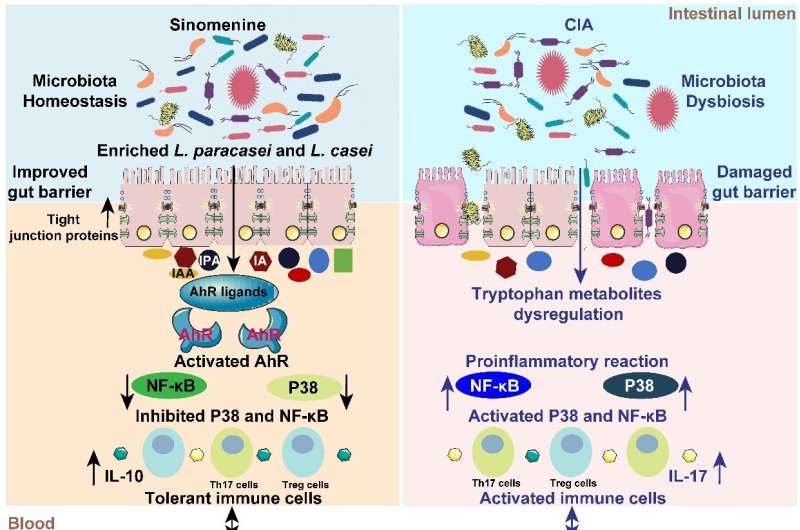This article has been reviewed according to Science X's editorial process and policies. Editors have highlighted the following attributes while ensuring the content's credibility:
fact-checked
trusted source
proofread
Research explores mechanism by which sinomenine ameliorates rheumatoid arthritis

Since the concept of "gut-joint" axis was proposed, increasing evidence has shown that the imbalance of gut microbiota may play a key role in the occurrence and development of rheumatoid arthritis (RA).
Sinomenine (SIN) has been developed as a marketed anti-RA drug in China due to its noticeable anti-inflammatory and immunosuppressive effects. Mounting evidence proves the protective effect of SIN on RA is achieved mainly through the regulation of immunocytes, inflammatory cytokines, and inflammation-related signaling pathways. SIN was poorly absorbed into the systemic circulation, but it could modulate the gut microbiota composition to prevent chronic inflammation-associated diseases.
Thus, the beneficial effects of SIN on RA might be due in part to the actions of gut microbiota. However, the key gut microbial species and critical microbial signaling metabolites associated with the anti-RA of SIN remain elusive.
First, Zheng-Meng Jiang and colleagues demonstrated that SIN could significantly relieve the joint damage and inflammation of collagen-induced arthritis (CIA) in a gut microbiota-dependent manner.
Subsequently, 16S rRNA gene sequencing and metabolomics analysis indicated that SIN relieves microbial imbalance and intestinal barrier dysfunction by mainly modulating the abundance of Lactobacillus, and significantly enrich gut microbiota-derived tryptophan metabolites.
By further exploring the underlying mechanism of SIN-mediated gut microbiota regulation, the team found that tryptophan metabolites (indole-3-acrylic acid, indole-3-propionic acid, and indole-3-acetic acid) supplementation could improve RA-associated inflammation and Th17/Treg imbalance by activating aryl hydrocarbon receptor (AhR) to modulate NF-κB and MAPK phosphorylation.
Intriguingly, both in vitro screening and in vivo mono-colonization studies confirmed that SIN relieved the arthritis symptoms involving the enrichment of two beneficial anti-CIA Lactobacillus species, L. paracasei and L. casei.
The work is published in the journal Science Bulletin.
More information: Zheng-Meng Jiang et al, Sinomenine ameliorates rheumatoid arthritis by modulating tryptophan metabolism and activating aryl hydrocarbon receptor via gut microbiota regulation, Science Bulletin (2023). DOI: 10.1016/j.scib.2023.06.027



















